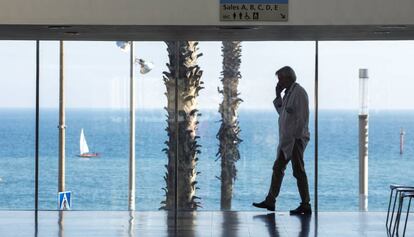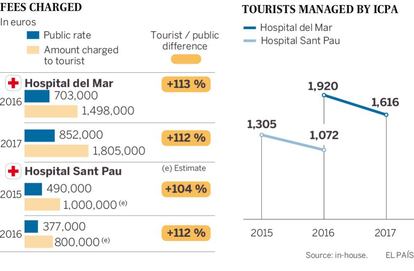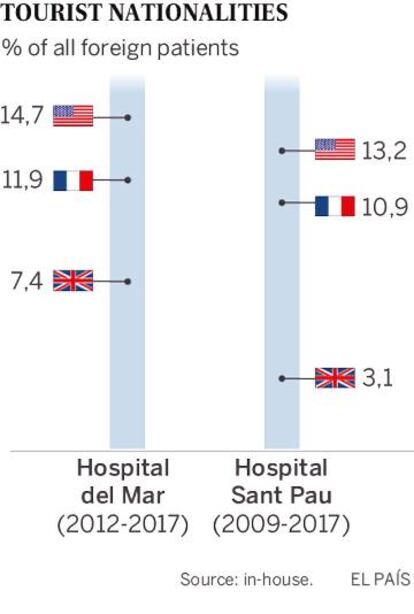How sick tourists in Barcelona are being scammed on their hospital stays
A third-party company is doubling and even tripling the hospital bills of foreigners in the Catalan capital

Falling sick on a trip to Barcelona can not only ruin your vacation, it can also wreak havoc on your bank account – if you’re a foreign tourist, that is. A third-party company employed by two of Barcelona’s main public hospitals, Hospital del Mar and Hospital de Sant Pau – both located in popular tourist spots – is applying an extra fee for handling a patient’s bill, which can triple official rates, according to documents seen by EL PAÍS.
The prices they demand were absurd, far above what is charged in countries in the north of Europe Lawyer María del Carmen González
Last year, the company International Care Patient Assistance (ICPA, named Gestitursa up until 2012) managed the bills of 1,615 tourists at Hospital del Mar. The center received €852,000, according to the fees approved by its Advisory Board. ICPA however, charged tourists more than double that amount: €1,805,000. Although a small part of the extra money went back to the hospital – an agreement on a set fee ensures the center receives 55% of a patient’s bill – €9 out of every €10 paid by tourists above the official rate went to ICPA.
The contract signed with the Hospital de Sant Pau does not have the same agreement, which means it is impossible to know how much the ICPA fee is. Indeed, the hospital admits that it does not know what the business is charging foreign tourists – an average of 725 of whom pass through the hospital every year. But all documents – business income, receipts – indicate that the margin charged by ICPA could be even higher.

For example, a German tourist was admitted to Sant Pau after having a heart attack and needed a bypass and catherization. The bill was more than €68,000 and even included the price of Aspirin at €2.59 per packet. But public rates approved by the Catalan regional government in 2013 show that the complete treatment costs €19,908. This amount closely coincides with an estimate from an expert from the patient’s insurer, who has brought the case to court.

ICPA is a unique case in the health sector. The business was founded over a decade ago, like others in the sector, to help Spanish hospitals take care of one of their oldest problems: charging patients who, once they have been discharged, return to their home countries.
The rest of these businesses work as a service provider to the hospital administration, without adding extra fees to a tourist’s bill. Instead, the hospital compensates for the cost of their service by increasing a patient’s bill. ICPA instead acts as a complete third party: they buy the right to provide assistance to hospitals at regulated prices and resell it to a patient at a much higher rate.
This model has led to numerous complaints and lawsuits in the last decade, pushing all hospitals outside of the Catalonia region to end their contracts with ICPA. These hospitals were located in Costa del Sol, Marbella, Denia and Torrevieja in Valencia, Manacor in the Balearic Islands, Madeira in Portugal and Turkey.
A patient received a hospital bill for €68,000 but the official rate should have been around €19,908
Not only did patients (and their insurance agencies) repeatedly complain about ICPA’s extra charges, they also criticized its other practices, such as demanding a patient provide a hefty advance before they could receive assistance. A 2013 report from the Valencia region health department criticized the “dubious legality” of the ICPA payment system and another report from the General Intervention maintained that only hospitals “can directly and exclusively charge patients.” After seeing these reports, the hospitals in Denia and Torrevieja unilaterally terminated their contracts with ICPA, for “abusive billing outside of the contract terms,” as outlined by the Torrevieja hospital.
The regional government of Madeira also denounced the contract with a sister company of ICPA in Spain. A regional parliamentary commission reported various cases including a patient who had to “pay €650 for an arm cast.”
Nine out of every 10 euros paid by tourists above the official rate went to ICPA
Most of the patients managed by ICPA have private insurance and these agencies end up footing the bill, although this does not mean they escape paying the extra charges. In some cases, Catalonia’s regional police say that it is the tourist who has to pay. In others, a patient must cover a portion of the bill because they opted for a co-payment scheme. According to an ICPA report, between 15% and 20% of tourists don’t have insurance and end up covering the entire cost of their treatment.
The hospitals in Barcelona defend the company and say that they have insured the “vital payment for services rendered.” Both centers are financed in great part by the Catalan regional government but are managed autonomously. Hospital del Mar is governed by an Advisory Board and the Hospital de Sant Pau is a patron-run foundation.
ICPA representatives have said that “at all times” the company has followed “the requests made by hospitals in managing the payments of tourists.” The company blames the complaints on “pressure from insurance agencies,” and argues it provides “more services than just billing, such as interpreters, supporting the families of the sick in arrangements they might require and following up on patients after they have been discharged.”
EU reprimands Spain for ICPA practices
Insurance companies in the United Kingdom, the Netherlands and Germany have put up the toughest opposition to the ICPA billing system. From 2012, many of them have taken the company to court. "The prices they demand were absurd, far above what is charged in countries in the north of Europe, which are historically a lot more expensive," explains María del Carmen González, a lawyer who works with German clients for the law firm Ramallo Pallast & Partner.
In many cases, the exorbitant rates combined with another problem: ICPA's refusal to accept the European Health Insurance Card (EHIC) – which gives EU citizens the right to be treated in the same conditions as Spaniards – of tourists with private insurance. "They are breaching EU standards," says Mark Lee from the British law firm Penningtons Manches.
Due to the ongoing complaints, the European Commission brought a formal case against the Spanish government that was heard by the Interterritorial Health Council on April 18, 2012. The council ordered all Spanish regions to ensure their hospitals were accepting the EHIC. When this had no effect the Commission began disciplinary action but this was archived on 2014 after it was proved the practice had stopped.
David Sánchez Almagro, a specialist lawyer in the sector, says the problem is "ICPA's abusive practices." "My clients are insurers and it's not true they don't want to pay. What they can't accept is that they are billed double or triple the rates that are fixed by the very hospitals because a business has raised the bill in this way."
English version by Melissa Kitson.
Tu suscripción se está usando en otro dispositivo
¿Quieres añadir otro usuario a tu suscripción?
Si continúas leyendo en este dispositivo, no se podrá leer en el otro.
FlechaTu suscripción se está usando en otro dispositivo y solo puedes acceder a EL PAÍS desde un dispositivo a la vez.
Si quieres compartir tu cuenta, cambia tu suscripción a la modalidad Premium, así podrás añadir otro usuario. Cada uno accederá con su propia cuenta de email, lo que os permitirá personalizar vuestra experiencia en EL PAÍS.
¿Tienes una suscripción de empresa? Accede aquí para contratar más cuentas.
En el caso de no saber quién está usando tu cuenta, te recomendamos cambiar tu contraseña aquí.
Si decides continuar compartiendo tu cuenta, este mensaje se mostrará en tu dispositivo y en el de la otra persona que está usando tu cuenta de forma indefinida, afectando a tu experiencia de lectura. Puedes consultar aquí los términos y condiciones de la suscripción digital.









































